
2024: The Rise of The Gen Z Workforce and Other New Workplace Trends

Ms. Pomerantz is the CEO of TPG HR Services USA and has over 35 years of Human Resources practices experience. She holds a Master’s in Human Resource Management (MHRM) and is a certified Senior Professional in Human Resources (SPHR) and SHRM Senior Certified Professional (SHRM-SCP). Mary also serves as CEO of Mary Pomerantz Advertising, one of the largest recruitment advertising agencies in the country. Earlier in her career, she was president of the 17th largest staffing firm in the country.
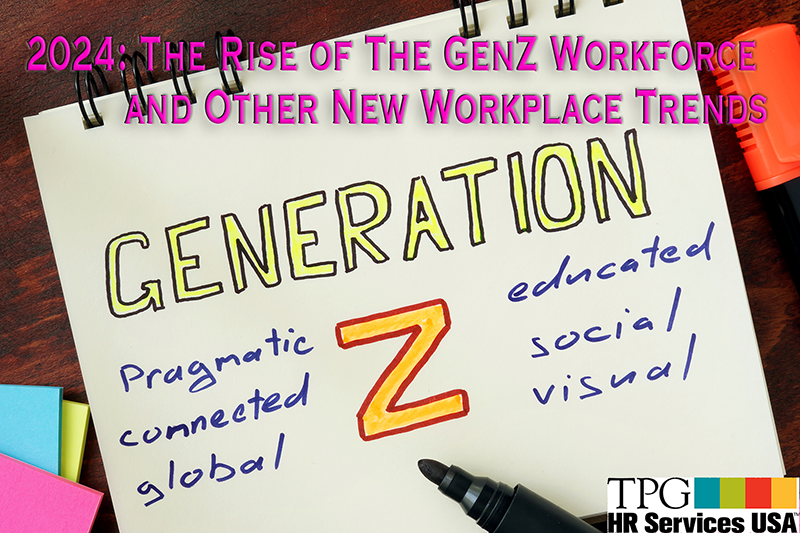
The rise of the Gen Z workforce and three other important workplace trends are set to have a huge impact on the world of work in 2024 and beyond. Employers and Human Resources professionals who recognize these new trends and have planned for their potential impact will have a substantial leg-up on competitors who choose to ignore them. Each of these trends on its own will leave a significant imprint on the workplace, and many of them feature interconnected elements that will reinforce one another in the years ahead. Understanding and adapting to the following important workplace trends will be a key differentiator for your organization to navigate successfully over the next decade:
- The Rise of the Gen Z Workforce
- Implementing Productive Remote and Hybrid Work Environments
- Balancing the Promise and Peril of Generative AI
- A Focus on Supporting Mental Health
The Rise of the Gen Z Workforce
Next year in 2025, Generation Z defined as those born between 1997 and 2012 are estimated to represent 27% of the workforce in leading Western countries and a full one-third of the global population. As an important and growing segment of the workforce, Gen Z workers play a vital role in any company’s success (or failure) – and understanding their unique experience and worldview is essential.
First off, the entry of Gen Z into the workforce has been anything but typical. Due to the global pandemic, they began working at a time of huge upheaval in the very nature of work and the workplace. With the rise of remote work, many missed the opportunity to ease into their professional duties by watching and learning from their more experienced colleagues in an office setting. The dearth of in-person job coaching, combined with the limited sense of camaraderie that can develop when working remotely, has led many Gen Z workers to feel more uncertain, anxious, and stressed than they would otherwise be in their new professional roles.
Source: https://www.businessinsider.com/remote-work-fueling-gen-z-job-anxiety-stress-mental-health-2023-12

Gen Z is the most ethnically diverse generation in US history, with more than 50% from non-white backgrounds.
Source: https://www.forbes.com/sites/rachelwells/2023/10/23/the-future-of-work-key-emerging-workplace-trends-to-watch-for-2024/?sh=cd3eeed2eb3d
The Most Diverse Generation in US History
One of the key components of the Gen Z mindset arises from its demographics. Gen Z is the first generation of Americans whose members are primarily non-white ethnically. They have come of age with diversity as a reality and an expectation rather than an aspiration or a fear. Members of Gen Z have:
“grown up in a globally connected world, exposed to diverse cultures, perspectives, and experiences. They celebrate diversity, inclusivity, and equality, actively seeking to learn from and engage with different cultures. Gen Z’s global awareness influences their preferences, values, and interactions, shaping a more interconnected and inclusive society.”
Source: https://www.qureos.com/hiring-guide/gen-z-statistics
This formative experience influences how Gen Z sees a variety of issues both inside and outside of the workplace. Their global perspective has a significant impact on how they perceive issues related to diversity, equity, and inclusion – as well as global environmental issues such as sustainability. In fact, Gen Z’s passion for sustainability has made them a driving force in shaping conversations and pushing for a more eco-conscious society. And, among members of Gen Z, it’s not just talk:
- 72% say they have already changed their behavior to reduce their impact on the environment.
- 66% are willing to pay more for sustainable or environmentally friendly products.
- 73% would pay more for ethically sourced products.
- 56% believe that businesses should take responsibility for environmental issues.
- 72% feel that companies should be held accountable for their environmental impact.
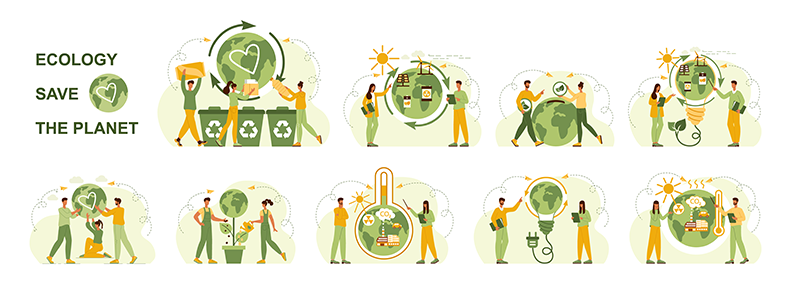
Top 5 Factors Gen Z Members Consider When Choosing a Workplace
When it comes to choosing a workplace, Gen Z members often have quite a different calculus than individuals of any previous generations that have come before. Although a competitive salary is important to them, it is far from the most important factor, according to many work questionnaires about Gen Z employees. Research into Gen Z workplace trends has shown that a competitive salary is only the fifth most important factor they consider when selecting a workplace, behind criteria such as impact on society, diversity and inclusion, work/life balance, and health insurance.
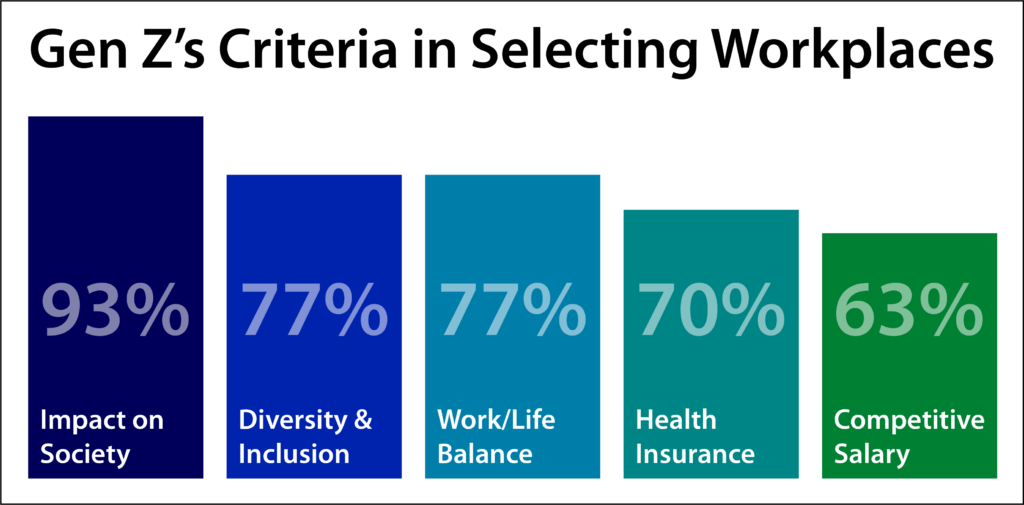
Source: https://www.qureos.com/hiring-guide/gen-z-statistics
Coming of Age in the Remote Workplace
Gen Z workers have arrived in the workforce at an unusual and unprecedented time, corresponding with the seismic shift to remote work during and after the global pandemic. This transition to remote and hybrid work environments has been challenging for all workers and employers, but many Gen Z workers have the added stress of never having experienced a “normal” office environment during their first years in the workforce. This leaves them with an increased sense of uncertainty regarding office etiquette and basic business norms that they would have picked up organically from in-office socialization in previous eras. This sense of uncertainty can even lead to acute anxiety among Gen Z workers, as evidenced by a recent survey in which nine in ten Gen Z workers said they avoided in-person events because of social anxiety. Research into Gen Z workplace trends has shown that almost one-quarter of Gen Z workers stated they were uncomfortable speaking up in team meetings and sharing their ideas. Employers need to recognize these new Gen Z workplace trends and try to design their remote and hybrid work environments to help this new generation of employees succeed in their organizations.
Source: https://www.businessinsider.com/remote-work-fueling-gen-z-job-anxiety-stress-mental-health-2023-12
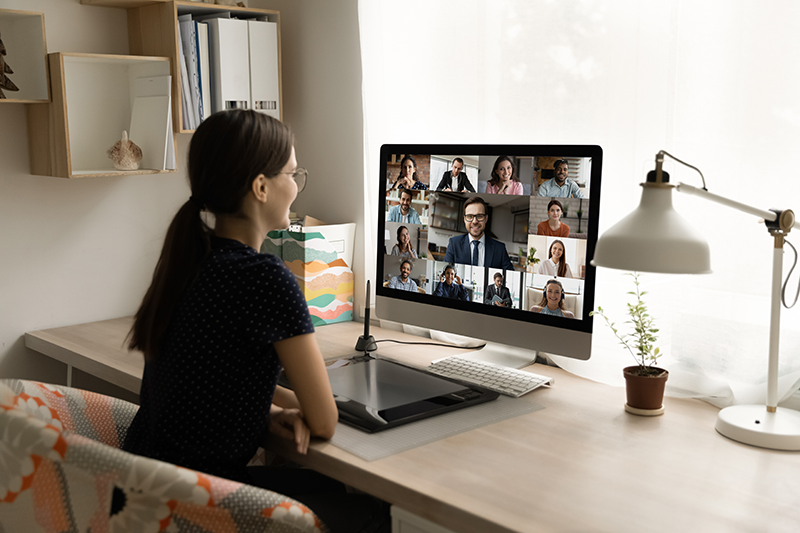
Implementing Productive Hybrid Workplace Environments
This brings us to our next interrelated workplace trend that employers and Human Resources professionals need to get on board with for their organizations to be successful in the years ahead with Gen Z employees: successfully implementing productive hybrid workplace environments. The global pandemic threw many companies headlong into a rapid shift to create remote and hybrid work environments for their employees. Employers had little time available to experiment with different workplace scenarios to determine which might maximize productivity and overall effectiveness. In the midst of a health crisis, this was understandable and unavoidable; however, organizations now have the time to re-examine their remote and hybrid work arrangements and recalibrate them to produce the best results. While some companies have simply returned to their former traditional office model, and others have adopted the other extreme of the new remote workplace environment, the hybrid workplace that balances these two workplace models is still currently the most popular while also holding appeal to the Gen Z workforce.
Some Quotes on Remote/Hybrid Work
“Remote work can make everything feel so much more intense. It’s much harder for me to mentally let go of any stresses from the day.”
Source: https://www.businessinsider.com/remote-work-fueling-gen-z-job-anxiety-stress-mental-health-2023-12
“You…need technology tools that support flexible work and scheduling tools for hybrid employees. Maybe someone gets their work done onsite between seven and three instead of between nine and five.” [6]
Source: https://robinpowered.com/blog/future-of-work-workplace-trends
“You can have the best technology in the world and make all the RTO mandates you want and try to enforce them, but if people’s onsite experience and productivity aren’t supported, they simply won’t come into the office.” [6]
Source: https://robinpowered.com/blog/future-of-work-workplace-trends
The Return To Office (RTO) Movement
For many companies, achieving the optimal hybrid work environment will involve convincing employees to return to the office physically (at least part of the workweek) from a primarily remote work arrangement. These RTO policies often involve both “carrot and stick” elements and need to be phased in carefully and transparently. Some managerial “carrots” may include incentives such as free snacks, social events, and peer-to-peer mentoring opportunities; conversely, some “sticks” can include elements such as badge tracking or validation of work-from-home days by managers, for example.
While employing these RTO strategies, it is essential that employers and HR professionals have open lines of communication with their employees and constantly seek feedback on which policies are working and which may need to be adjusted. An important part of this feedback process is ensuring that all segments of your workforce are included, as specific groups such as Gen Z employees or disabled employees (among others) may face unique challenges that deserve attention. In addition, the adoption of quantifiable metrics to judge the impact of these policies can be extremely helpful in evaluating their effectiveness and adopting any mid-stream adjustments.
Source: https://hubtobee.com/en/blog/workplace-trends-2024/

Balancing the Promise and Peril of Generative AI
As if the seismic shift to hybrid work environments weren’t enough of a challenge for employers and HR professionals to confront, the explosive growth in the prevalence and usefulness of Artificial Intelligence (AI) has caught many by surprise. The productivity-enhancing nature of AI is obvious to all. The rise of generative AI simplifies information access and automates repetitive tasks that once required human employees to complete. This will, somewhat paradoxically, heighten the importance of human-to-human interaction for those tasks for which AI is not suited.

“AI won’t replace jobs outright but rather those who can use AI will replace those who can’t.”
Source: https://hubtobee.com/en/blog/workplace-trends-2024/
Becoming a proficient AI-augmented worker will involve understanding its limits and recognizing where human qualities like creativity, empathy, and innovation are still crucial. Soft skills will gain prominence as tasks previously done manually become automated, leaving behind more human-centric responsibilities that require strong interpersonal skills. When AI takes over managing routine administrative tasks, then employee collaboration, creativity, innovation, and problem-solving are going to be much more important.
Source: https://robinpowered.com/blog/future-of-work-workplace-trends
AI in Recruitment
In the near future, Generative AI is poised to have an outsized impact on the labor market, on career and learning pathways, and shaping new work realities. AI and machine learning specialist jobs are expected to explode in the next few years, leading to a potential war for AI talent among a diverse array of businesses across the spectrum. The recruitment data on this subject is already mind-boggling, and we are just at the beginning of this trend. For example, on LinkedIn alone, the number of job postings mentioning ChatGPT as a desirable requirement has surged by 21 times, with the number of generative AI keywords such as “ChatGPT” or “prompt engineering” on LinkedIn members’ profiles rocketing 75% month over month on average since January 2023. All organizations need to create a plan to recruit talent and train current employees on how AI can enhance their own productivity.
A Focus on Supporting Mental Health
The final of these four 2024 workplace trends might at first seem unconnected to the others, but it is, in fact, a critically linked component for helping your workforce adapt to the dramatic changes represented by the first three trends we highlighted. In a rapidly shifting workplace where new Gen Z employees are attempting to find their way, employers are experimenting with hybrid work schedules, and AI is set to change the nature of work itself in unforeseen ways – employees will naturally feel anxious, untethered, uncertain, and otherwise stressed in ways that they have never felt before. The need to focus on supporting mental health is more important than ever.
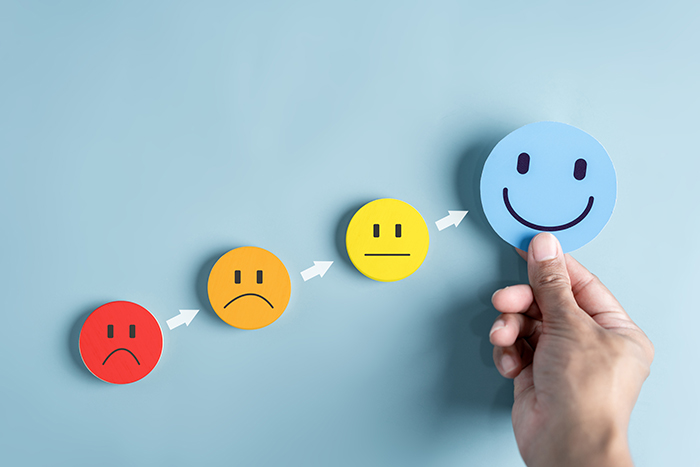
46% of Gen Z and 39% of Millennials feel stressed or anxious at work all or most of the time.
Source: https://hubtobee.com/en/blog/workplace-trends-2024/
Employers and HR departments that make an effort to prioritize work/life balance and wellness and foster personal growth and development among their employees will reap substantial benefits from these policies, more so than at any other period of time. By proactively addressing employee well-being and mental health concerns, organizations can build up a resilient workforce that is armed with the necessary tools to confront the massive changes that lie ahead. Organizations that do not focus on supporting their employees’ mental health do so at their peril and will likely lose talent and market share to those that do.
TPG HR Services can assist your recruiting efforts by recruiting for you or helping facilitate any part of the recruiting process.
